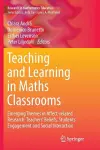
Teaching and Learning in Maths Classrooms
4 contributors - Paperback
£109.99
Domenico Brunetto is a young researcher at the Mathematics Department, Polytechnic of Milan. His research interests are: the usage of multimedia (especially MOOCs) in classroom practice, the interaction between students in small and large groups, and network analysis. His current research project analyses and models student interactions, both online and in the classroom, using opinion dynamics models adapted to the teaching-learning context.
Chiara Andrà is a post-doctoral fellow at the Mathematics Department, Polytechnic of Milan. Her research interests include: intuitions in probability, social interactions in small group activities in the math classroom, the transition from secondary to tertiary education, and mathematics teacher education.
Esther Levenson is a researcher and instructor at the Department of Mathematics, Science and Technology Education at Tel-Aviv University, and at the Kibbuztim College of Education. In her PhD study she investigated mathematically and practically based explanations in the elementary school, especially individual preferences and socio-mathematical norms. Her current research interests include: fostering mathematical creativity among students and teachers, developing mathematical thinking among preschool children and their teachers, and the role that examples play in eliciting explanations. She serves on the editorial board of Educational Studies in Mathematics, and the Journal of Mathematics Teacher Education.
Peter Liljedahl is an Associate Professor of Mathematics Education at the Faculty of Education, an associate member of the Department of Mathematics, and co-director of the David Wheeler Institute for Research in Mathematics Education at Simon Fraser University in Vancouver, CA. He is also the president of the IGPME. He is a former high school mathematics teacher who has kept his research interests close to the classroom. These include: creativity, insight, and discovery in mathematics teaching and learning; the role of the affective domain on the teaching and learning of mathematics; the professional growth of mathematics teachers; mathematical problem solving; and numeracy.